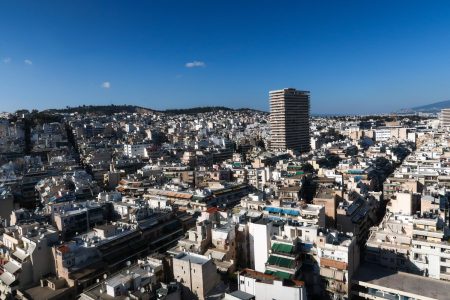Patience is running out is the message sent by the hotel and tourism operators from the podium of the general assembly of the Hellenic Hoteliers Federation (HHF) on how the state deals with the issue of short-term leases such as AirBnb.
The presidents of all institutions called for the adoption of rules of equal competition, arguing that they are not only hotels are losing, but also the state from the “shadow economy” that is flourishing in the hospitality sector, as they claim.
The time-sharing economy together with the increased operating costs and the lack of employees will be the “three thorns” for the Greek hotels during a season that seems that in many destinations will not only cover the sizes of 2019 but will be exceeded.
Short-term leases
The President of the Association of Greek Tourism Enterprises (SETE) Giannis Retsos stated in his greeting that a serious problem for Greek tourism in the last 10 years are short-term leases. He pointed out that short-term leasing is a part of the product, it is a global trend, we can not reject it. We also understand he underlined, why governments did not want to touch on this issue during the financial crisis, it was purely political-social, we were in a decade of memoranda, over-taxation and there was a possibility for the average Greek renting an apartment to have additional income.
But from that point, to companies from Greece and abroad appear to buy entire buildings, to transform them into hotels with full service and to announce that they strengthen the institution of short-term rent, it is more than a mockery to the tourist entrepreneurs living in a full control regime and large loss from taxes, insurance contributions, non-implementation of sectoral agreements. “We have,” underlined Mr. Retsos, “a regime that distorts competition and we are 100% against it and we will fight it as much as we can.” In fact, the president of SETE revealed that a grid of proposals has already been sent to the presidency of the government, to the Minister of State Akis Skerzos, in order to correct the framework, but for specific issues the implementing provisions should be set out.
Arrivals and revenue
For his part, Grigoris Tassios, president of the Hellenic Hoteliers Federation (HHF) said that “high demand, arrivals and our determination to do our best for the common good, does not mean that hotel cash registers can be the ‘goose that lays the golden eggs’. This is not the case at all and we should not be carried away by simplifications.”
“The recovery of arrivals is not automatically reflected in the recovery of hotel funds. The mirror of arrivals is distorting. Firstly because a large portion of arrivals are lost in the gray area of the sharing economy. Secondly, because the heavy blow of the pandemic has left open wounds that translate into liabilities to the public and the banks. Third, as a wise proverb of Halkidiki says “on the grain’s”. Following the shock of the pandemic, we are facing a global tsunami of price increases in energy and products, at a time when a war is taking place in Europe and the situation is deteriorating daily. At the moment we are talking about the operating cost per night room is increased by 25-30% “.
The Hotel Chamber of Greece
According to the president of the Hotel Chamber of Greece, Alexandros Vasilikos, “a common denominator in many problems is the non-regulation of the sharing economy. Colleagues rented houses for their staff. “Now not only do these houses not exist, but they are also active and absorbing staff,” he stressed. He then gave an example where a French chef works in a villa on a famous island, which is rented for 5,000 euros a day and he is paid 3,000 euros in unreported cash to serve eight people. The said chef will never return to a hotel with a good but taxed and registered salary and obligation to cook for 1,000 people, with a salary of 3,000 euros that burdens the hotelier with a total of over 5,500, said Mr. Vasilikos, who has already appealed to the Commission as president of the Chamber. Competition led by unfair practices by large booking platforms.
George Pitsilis, Manager of the independent authority for state revenue – AADE noted that the Authority has already started to receive data from the platforms as part of the initiative it has developed. The process of identifying data with administrators and owners is laborious. It is a process that takes time, the legislation has allowed us to conclude memoranda of cooperation with the three major platforms and by the end of the year there will be no available properties that will not have the relevant registration number. The framework is one of the most innovative, stressed Mr. Pitisilis and noted that in the near future more specific actions will be taken for those who have not declared an operating signal and those who evade taxes will be found soon.
Lack of employees
At the General Assembly, the issue of the lack of employees was also emphasized. As it was said, it concerns the whole range of services, not only tourism, not only Greece, the whole of southern Europe. Mr. Retsos spoke about a strategic approach to the problem and difficult political decisions, because it is clear that the Greeks who want to engage in tourism are not enough to fill jobs. we need workers from abroad with very strict procedures according to the standards of other countries (Spain, Cyprus) and private sector policies in cooperation with the government to alleviate seasonality which is the main reason why young people do not want to work in tourism , stressed Giannis Retsos



